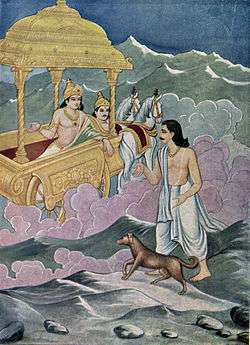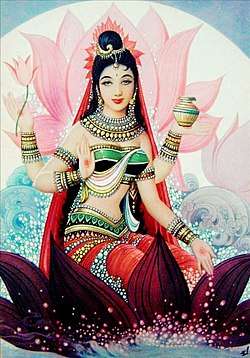Svargarohana Parva
Svargarohana Parva (Sanskrit: स्वर्गारोहण पर्व) or the Book of the Ascent to Heaven, is the last of eighteen books of the Indian epic Mahabharata. It traditionally has 6 chapters.[1][2] The critical edition has 5 chapters.[3][4] It is one of the shortest books in the Mahabharata.

Svargarohana Parva describes the arrival of Yudhishthira in heaven, his visit to hell and what he finds in both places. Yudhishthira is upset when he finds evil people in heaven and good people in hell. He demands he be sent to hell where people who love him are. The gods then reveal that their loved ones are in heaven. The Parva ends with Yudhishthira happy.
Structure and chapters
Svargarohana Parva (book) traditionally has 6 adhyayas (sections, chapters) and has no secondary sub-parvas (sub-books or little books).[1] It is the second smallest book of the Epic.[5]
After entering heaven, Yudhishthira is frustrated to find people in heaven who had sinned on earth. He then asks for a visit to hell and there he finds people who he thought were good and virtuous on earth. He questions whether gods were fair at all, whether virtue during earthly life means anything ever and then in anger demands that he be sent to hell so he can be with those people who were good, just, virtuous, who he loved and who loved him. The gods then remove the fake hell they had created for show. Deity Dharma appears and congratulates Yudhishthira for always standing up for dharma and sends him to vaikunth where he finds eternal bliss.

Yudhishthira is happy. He meets Krishna next, in his form as Vishnu. He then sees Draupadi in heaven with his other brothers.
English Translations
Svargarohana Parva was composed in Sanskrit. Several translations in English are available. Two translations from 19th century, now in public domain, are those by Kisari Mohan Ganguli[1] and Manmatha Nath Dutt.[2] The translations vary with each translator's interpretations.
Debroy, in 2011, notes that updated critical edition of Svargarohana Parva, after removing verses generally accepted so far as spurious and inserted into the original, has 5 adhyayas (chapters) and 194 shlokas (verses).[5]
Significance
Svargarohana Parva is significant for claiming Vyasa as the creator of a poem with 6, 000, 000 verses with all the eternal knowledge there is. Of these, he gave the gods 3,000,000 verses, 1,500,000 verses to Pitrs (ancestors), 400,000 verses to Yakshas (nature-spirits) and 100,000 verses as Mahabharata to human beings. It does not disclose where the unaccounted for 1,000,000 verses are. It ends with the claim that the Epic has all the shades of Truth in it.[1][6]
Chapter 4 of Svargarohana Parva is also significant for claiming Krishna in the form of Brahman.[7] In Anushasana Parva, Krishna was declared to be a form Vishnu and of Shiva. This synonymous listing of various forms of Krishna as one, in Mahabharata, has led[8] to the theory that all gods mentioned in Vedic literature are different forms of one god. This is a well accepted theory as other ancient scriptures describe Sri Vishnu as supreme while Brahma and Shiva are clearly established as lesser deities in standard texts.[9]
Quotes & Teachings
Svargarohana Parva, Chapter 5:
There are thousands of occasions for joy and hundreds of occasions for fear;
These affect only him that is ignorant but never him that is wise;
With uplifted arms I am crying aloud but nobody hears me.
From Righteousness[10] comes Wealth, also Pleasure;
Why should not Righteousness, therefore, be courted?
For the sake neither of pleasure, nor of fear, nor of cupidity should any one cast off Righteousness.
Indeed, for the sake of even life one should not cast off Righteousness;
Righteousness is eternal. Pleasure and Pain are not eternal;
Jiva is eternal. A body is not so.
See also
References
- Ganguli, K.M. (1883-1896) "Svargarohanika Parva" in The Mahabharata of Krishna-Dwaipayana Vyasa (12 Volumes). Calcutta
- Dutt, M.N. (1905) The Mahabharata (Volume 18): Swargarohanika Parva. Calcutta: Elysium Press
- van Buitenen, J.A.B. (1973) The Mahabharata: Book 1: The Book of the Beginning. Chicago, IL: University of Chicago Press, p 478
- Debroy, B. (2010) The Mahabharata, Volume 1. Gurgaon: Penguin Books India, pp xxiii - xxvi
- Bibek Debroy, The Mahabharata : Volume 3, ISBN 978-0143100157, Penguin Books, page xxiii - xxiv of Introduction
- John Murdoch (1898), The Mahabharata - An English Abridgment, Christian Literature Society for India, London, pages 137-138
- Svargarohana Parva The Mahabharata, Translated by Kisari Mohan Ganguli, Published by P.C. Roy (1893)
- Steven J. Rosen, The Agni and the Ecstasy, p. 185, at Google Books, ISBN 978-1907166792
- Lionel Barnett (1923, Reprinted 2009), Hindu Gods and Heroes, ISBN 978-1444458435, Valde Books
- Original word in Sanskrit here is Dharma, see Book 18 of The Mahabharata in Sanskrit
External links
- Svargarohana Parva, English Translation by Kisari Mohan Ganguli
- Svargarohana Parva, English Translation by Manmatha Nath Dutt
- Svargarohana Parva in Sanskrit by Vyasadeva with commentary by Nilakantha - Worldcat OCLC link
- Svargarohana Parva in Sanskrit and Hindi by Ramnarayandutt Shastri, Volume 5
